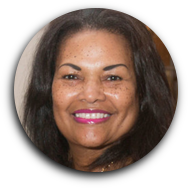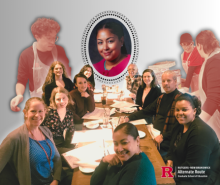Alternate Route Leaders Discuss 21st Century Teachers' Changing Characteristics
Every year around this time, we at Rutgers Alternate Route host a daylong conference filled with keynote addresses and workshops that highlight promising research and technology innovation, professional development techniques, and teaching strategies. Following these events, our alternate route teacher candidates leave more inspired, excited and prepared for the long-lasting careers in education that await them.
In honor of this year’s conference theme, “Re-Imagining Teacher Professional Practice”, we sat down with Dr. Tammy Jenkins and Dr. Phyllis Bivins-Hudson to discuss the future of teaching. Both Dr. Jenkins and Dr. Hudson have decades of experience serving as teachers, administrators, and beloved coaches for other teachers. They also were founding faculty members of the Rutgers Alternate Route Teacher Training Program and visionaries for our annual conference.
How has teaching changed during your career?

Phyllis: Teaching has changed over the years of my tenure in education in many ways. However, some of the most significant changes I have observed include the number of people entering the field of education from other careers, an oversaturation of standardized testing and learning to provide instruction and professional development through the use of technology.
 Tammy: The infusion of technology into the education world has made things totally different from when I first began instructing. Technology’s infiltration of how teachers manage classrooms and instruct students are totally revolutionizing the way teachers must now approach the profession. The whole idea of teachers and students using technology to globalize the curriculum, provide asynchronous and synchronous learning experiences for students is part of a whole new realm of teaching.
Tammy: The infusion of technology into the education world has made things totally different from when I first began instructing. Technology’s infiltration of how teachers manage classrooms and instruct students are totally revolutionizing the way teachers must now approach the profession. The whole idea of teachers and students using technology to globalize the curriculum, provide asynchronous and synchronous learning experiences for students is part of a whole new realm of teaching.
 Phyllis: Helping children understand how to incorporate technology into what they do with respect to research has been another challenge and change over the years. Many teachers find children aren’t using technology with the fidelity intended. In part, this is because teachers’ expectations for students to think critically does not always occur. Online information has become so plentiful that students are using it as their think tank rather than a resource for a finished product.
Phyllis: Helping children understand how to incorporate technology into what they do with respect to research has been another challenge and change over the years. Many teachers find children aren’t using technology with the fidelity intended. In part, this is because teachers’ expectations for students to think critically does not always occur. Online information has become so plentiful that students are using it as their think tank rather than a resource for a finished product.
How do you see edtech influencing teachers' roles in the next 5 years?



Tammy: We are reaching the time that schools will transform completely. Edtech opportunities that were once exclusively offered in higher ed are are being opened up for young students. There are now more 100% online learning models being developed at early stages of education. Also with globalization, things may change. We are seeing more and more environments where students are learning remotely.

Phyllis: Despite these advances, children from underprivileged areas will continue to be at a disadvantage because they do not have access to technology in their homes and will not be able to attend virtual classes, resulting in them falling further and further behind. Administrators will need to keep those issues in perspective when planning new technology integration models.
What new skill sets do you foresee teachers needing to learn in the next 5 years?

Phyllis: Teachers must have some demographic knowledge of the children they service. Additionally, they need to have psychology courses to help them understand children, adolescents and young adults. And there has to be an assertive effort to recognize and respect the various cultures and differentiated learning styles which exist in their classrooms.

Tammy: One skill teachers are going to need, that isn’t necessarily required right now, is having more formal training in counseling, group dynamics and things of that nature because of the complexity of the students right now. The issues we used to compartmentalize and give to school counselors will now need to be managed by classroom teachers.

Phyllis: To further develop Dr. Jenkins’ point, when teachers enter classrooms with a lack of understanding and a disregard for the myriad of differences students come with, these attitudes often become missed opportunities for growth on the part of the student as well as the teacher.

Tammy: Indeed, the layers of emotional baggage students are bringing to the classroom and their lack of homogeneity will require teachers to better support students psychologically. There are so many changes within our culture, like the transgender movement for instance, that teachers will need to help students navigate.

Phyllis: Dr. Jenkins is exactly right. Teachers are going to need additional training to address these changes. And a concern is how school districts are going to adequately train teachers in this regard.
---
The above conversation reflects the type of progressive discussion that’s encouraged at our conference. We have no doubt that our candidates will leave this year’s conference with a deep understanding of how they can effectively adapt and enhance their teacher toolbox now and in the future.
Special thanks to Dr. Tammy Bowling-Jenkins and Dr. Phyllis Bivins-Hudson, who are both Adjunct Faculty Instructors of Rutgers CESP's Alternate Route Teacher Training Program.

 Heather Ngoma has over 25 years of experience collaborating with educators across New Jersey to drive education innovation. She currently serves as the Director of the Rutgers-GSE Alternate Route Program in the Department of Learning and Teaching, a program which helps career changers, recent college graduates, and other aspiring education professionals become licensed teachers in New Jersey. Follow her on Twitter @heatherngoma.
Heather Ngoma has over 25 years of experience collaborating with educators across New Jersey to drive education innovation. She currently serves as the Director of the Rutgers-GSE Alternate Route Program in the Department of Learning and Teaching, a program which helps career changers, recent college graduates, and other aspiring education professionals become licensed teachers in New Jersey. Follow her on Twitter @heatherngoma.





